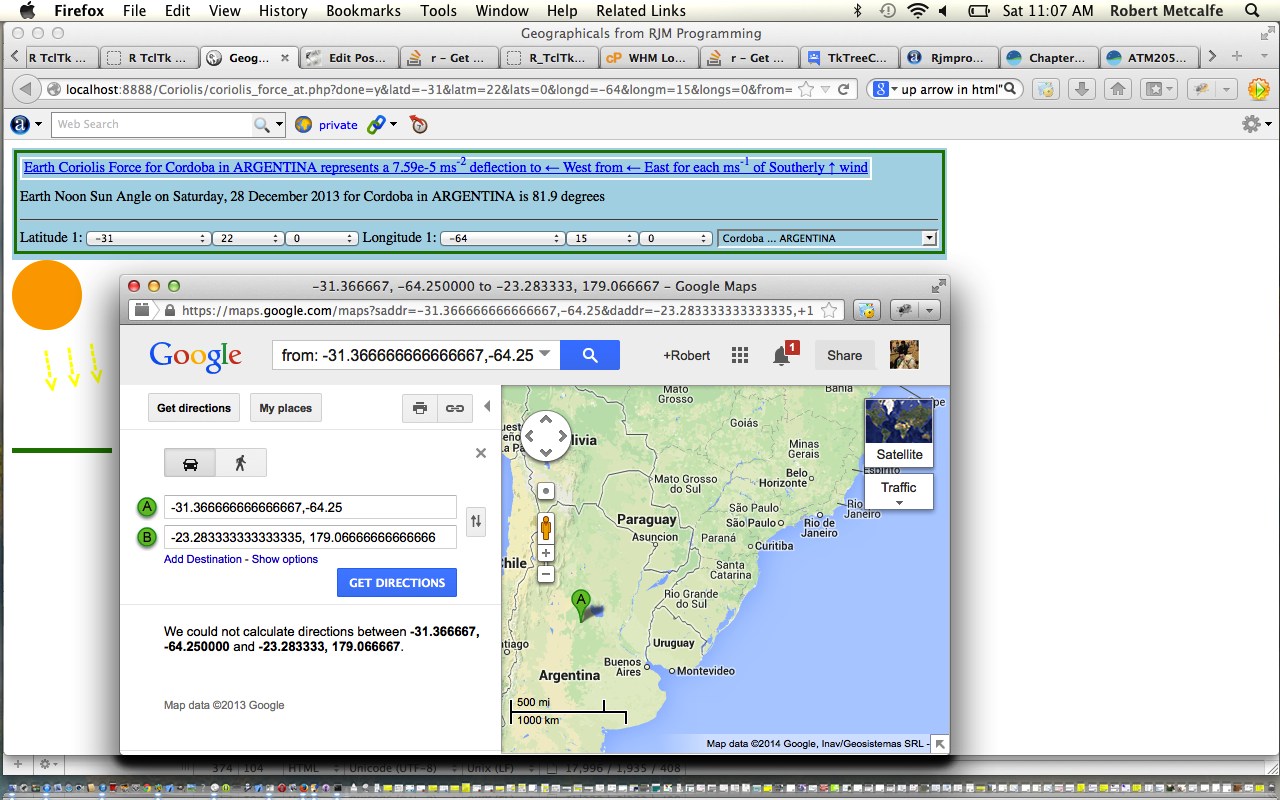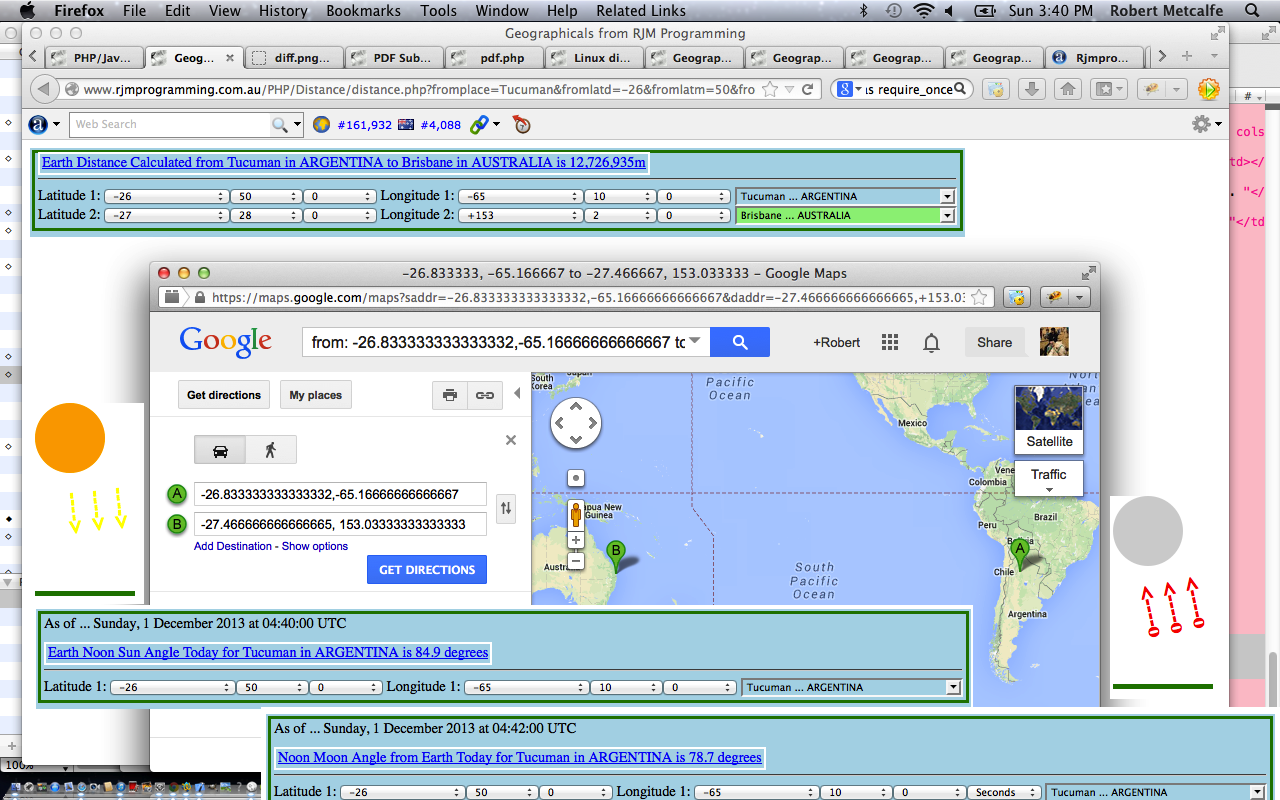Lame alert! One of the things I’ve always wanted to do was to be on either a plane, or better still, a ship before and after it crosses the Equator. And which room do you think would be best? For me, this is obvious … the bathroom, if it has a sink. Want to see what happens to the water as it swirls down the sink, because given a long enough time in the bathroom (on the ship have somebody tell the rest you have dysentery … perhaps also check ahead of time that the ship has no padded cells) you should see the water change direction in the way it goes down the sink. The cause of this is the Coriolis Effect.
This tutorial becomes part of the various functionalities, optionally using placename lookups, of Latitude and Longitude, as presented on this blog. That is discussed in the tutorial shown below called PHP/Javascript/HTML Geographical Placename Integration Tutorial.
The Javascript embellishments in this tutorial mainly revolve around:
The use of window.open can sometimes be blocked by web browsers depending on their settings and you can read a bit more about such issues here.
Useful tutorials that helped, and we give thanks to, were:
- Chapter_8_txtb.pdf
- ATM205 Homework 1 solution
- 0.chapter1.doc – ch1.pdf
- Coriolis effect – Wikipedia, the free encyclopedia
- Character Entity Reference Chart
- JavaScript toPrecision() Method
- JavaScript toExponential() Method
Here is a link to some downloadable PHP supervisory “parent” programming source code which you may want to rename to place_latlong.php
Here is a new link to some downloadable PHP “independent child” programming source code (in the top of three iframes … others help show differences to the Sun Angle code, which was the basis for this program) which you may want to rename to coriolis_force_at.php
Did you know (PHP-wise)?
if ( basename(__FILE__) == basename($_SERVER[“SCRIPT_FILENAME”]) ) {
echo “This will only happen when called directly, not when used with require_once nor include_once”;
}
Previous relevant PHP/Javascript/HTML Geographical Placename Integration Tutorial is shown below.
Here is a tutorial that presents various functionality via placename lookups of Latitude and Longitude. The inhouse functionality was applied in a centralized way when we did PHP/Javascript/HTML Geographicals By Placename Tutorial but for this tutorial, as promised, we add individual forms of the functionality to each of that “parent” application “child” functions in Sun Angles, Moon Angles and Great Circle Distances so that they can also sit independently of their parents with their own geographical placename dropdowns included. Am hoping it can give some pointers to ideas to do with supervision and automation, in that you can have an idea that works well (which is very important) but is not so user-friendly. Sometimes in this scenario a supervisory layer can improve things and make the application easier to use. Asking the question “What would make this easier to use?” is a good thing to step back and ask after you have created an application. And, of course, with all things, there is the “why”? Doing that here made me realise what was needed to improve the application was a data source that linked geographicals to placenames.
The Javascript embellishments in this tutorial mainly revolve around:
The use of window.open can sometimes be blocked by web browsers depending on their settings and you can read a bit more about such issues here.
Useful tutorials that helped, and we give thanks to, were:
- Placename geographicals via cURL
-
- Subsolar Point
- Subsolar Point calculator helper via cURL
- Sun Angle formulae
- Sydney positioning
- CSS Border Radius
- CSS 2D Transformation Rotations
-
- Sublunary Point
- Sublunary Point calculator helper via cURL
- Moon Phase calculator helper via cURL
- Sun Angle formulae applied to the case of the Moon Sublunary Point
- Sydney positioning
- CSS 2D Transformation Rotations
-
- Great Circle Distance formulae
- Javascript rounding
- Javascript commas for thousands
- Katmandu positioning via a Google search
Here is a new link to some downloadable PHP “independent child” programming source code which you may want to rename to distance.php
Here is a new link to some downloadable PHP “child” programming source code which you may want to rename to distance_lessold.php
Here is an old link to some downloadable PHP programming source code which you may want to rename to distance_old.php (for comparison purposes).
Here is a new link to some downloadable PHP “independent child” programming source code which you may want to rename to sun_angle_now_at.php
Here is a new link to some downloadable PHP “child” programming source code which you may want to rename to sun_angle_now_at_lessold.php
Here is an old link to some downloadable PHP programming source code which you may want to rename to sun_angle_now_at_old.php (for comparison purposes).
Here is a new link to some downloadable PHP “independent child” programming source code which you may want to rename to moon_angle_now_at.php
Here is a new link to some downloadable PHP “child” programming source code which you may want to rename to moon_angle_now_at_lessold.php
Here is an old link to some downloadable PHP programming source code which you may want to rename to moon_angle_now_at_old.php (for comparison purposes).
Live link to “independent child” Distance application.
Live link to “independent child” Sun Angle application.
Live link to “independent child” Moon Angle application.
These new “independent child” applications still work with the link to a live run of that “parent” supervisory application.
Did you know (PHP-wise)?
if ( basename(__FILE__) == basename($_SERVER[“SCRIPT_FILENAME”]) ) {
echo “This will only happen when called directly, not when used with require_once nor include_once”;
}
If this was interesting you may be interested in this too.
If this was interesting you may be interested in this too.




